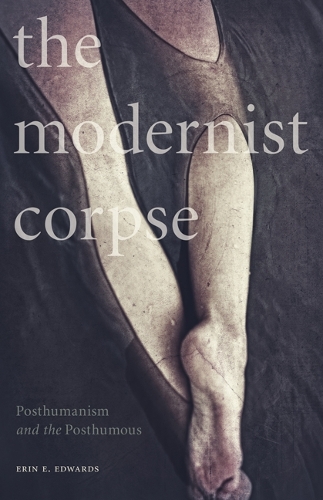
The Modernist Corpse: Posthumanism and the Posthumous
(Hardback)
Available Formats
Publishing Details
The Modernist Corpse: Posthumanism and the Posthumous
By (Author) Erin E. Edwards
University of Minnesota Press
University of Minnesota Press
16th January 2018
United States
Classifications
General
Non Fiction
Anthologies
Literature: history and criticism
810.93548
Physical Properties
Hardback
272
Width 140mm, Height 216mm, Spine 38mm
Description
An unconventional take on the corpse challenges traditional conceptions of whoand whatcounts as human, while offering bold insights into the modernist project
Too often regarded as the macabre endpoint of life, the corpse is rarely discussed and largely kept out of the public eye. In The Modernist Corpse, Erin E. Edwards unearths the critically important but previously buried life of the corpse, which occupies a unique place between biology and technology, the living and the dead. Exploring the posthumous as the posthuman, Edwards argues that the corpse is central to understanding relations between the human and its others, including the animal, the machine, and the thing.
From photographs of lynchings to documentation of World War I casualties, the corpse is also central to the modernist project. Edwards turns critical attention to the corpse through innovative, posthumanist readings of canonical thinkers such as William Faulkner, Jean Toomer, W.E.B. DuBois, Mina Loy, Djuna Barnes, and Gertrude Stein, offering new insights into the intersections among race, gender, technical media, and matter presumed to be dead. Edwardss expansive approach to modernism includes diverse materials such as Hollywood film, experimental photography, autopsy discourses, and the comic strip Krazy Kat, producing a provocatively broad understanding of the modernist corpse and its various lives.
The Modernist Corpse both establishes important new directions for modernist inquiry and overturns common thought about the relationship between living and dead matter.
Reviews
"The Modernist Corpse is a far-reaching and original study of the complexity of the cultural categories that organize representations of human life and death in modernist writing and art. Erin E. Edwards brings together an impressive range of writers, genres, and media, reflecting that increasingly expansive sense, among literary historians, of modernism's archive."David Sherman, author of In a Strange Room: Modernism's Corpses and Mortal Obligation
"The Modernist Corpse combines historically informed close readings of early twentieth-century works with an insistence on cultural and theoretical concerns that were barely visible at the time these works were made, but that loom large today, in retrospect. Erin E. Edwards shows us that American writers of a century agoFaulkner, Toomer, Barnes, and Steinwere already struggling with the dilemmas of what we see today as the posthuman condition."Steven Shaviro, author of The Universe of Things: On Speculative Realism
"The Modernist Corpse is a brilliant study of the costly differentiation between human and non-human as a legacy of the Cartesian separation of mind and body, such a division responsible for categorical boundaries warranting epistemological and ontological assumptions that organize western social hierarchies, including those of gender, race, and class. Erin Edwards readings of Faulkner, Toomer, Djuna Barnes, and numerous others are extraordinarily original in their demonstration of how modern literature is intent on imagining a posthuman humanness. The Modernist Corpse is a splendid bookintellectually tense, stylish, and relentlessly provocative."John T. Matthews, Boston University
"The Modernist Corpse vividly demonstrates that the posthumous and the posthuman are neither finite nor conclusive. Rather, these terms index conditions of possibility."American Literary History Online Review
"Through her posthumanist approach, Edwards infuses new life into the Modernist canon."The Goose
"The Modernist Corpse attempts not only to reanimate the corpse in modernism but to reimagine experimental modernism itself by rereading and reassembling its corpus."Critical Inquiry
Author Bio
Erin E. Edwards is associate professor of English at Miami University in Ohio.
